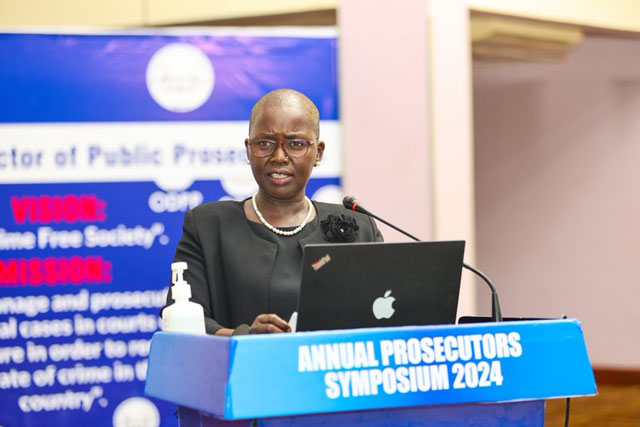
KAMPALA, UGANDA | THE INDEPENDENT | The Director of Public Prosecutions (DPP), Jane Frances Abodo, has issued a circular to all prosecutors with guidance on implementing the Supreme Court’s judgment that prohibits the trial of civilians in military courts. According to Circular No. 1/2025, the Supreme Court’s ruling, delivered on January 31, 2025, mandates that all charges, ongoing criminal trials, and pending trials involving civilians and UPDF members subject to military service laws must cease immediately.
These cases are to be transferred to civilian courts of competent jurisdiction. To facilitate this transition, DPP Abodo has stated that her office has formed a team of prosecutors who will be on standby to review investigative files and take appropriate action. The circular, a copy of which our reporter has seen, reads, “Top Management has constituted a team of prosecutors on standby who will handle investigative files whenever submitted to review and take appropriate action.”
Sources have indicated that the specific members of the team have not been disclosed for security reasons. The circular further instructs all prosecutors in field stations and departments to seek guidance from the DPP on any investigative files that may require coordinated management.
Last month, the Supreme Court, led by Chief Justice Alfonse Owiny-Dollo, ruled that all pending or partially heard cases involving civilians before the General Court Martial must be transferred to civil courts with proper jurisdiction.
Following this ruling, the Attorney General informed Parliament on Tuesday that the government is ready to comply and has sought the Chief Justice’s guidance on how the DPP should facilitate the transfer of files. However, President Museveni has expressed dissatisfaction with the ruling, stating that Uganda is “not governed by judges but by the people who are adult enough to participate in voting.” Article 92 of the Constitution prohibits Parliament from enacting laws that retroactively alter or overturn judicial decisions in cases that have already been decided.
In the wake of the Supreme Court’s decision, several civilians, including National Unity Platform supporters, lawyer Eron Kiiza, Dr. Kizza Besigye, and Obed Lutaale, who have been facing various charges arising from the Court Martial, have filed applications in the High Court seeking unconditional release. Many of them argue that they remain in prison without valid remand warrants, infringing upon their constitutional rights, such as the right to liberty.
***
URN
 The Independent Uganda: You get the Truth we Pay the Price
The Independent Uganda: You get the Truth we Pay the Price



